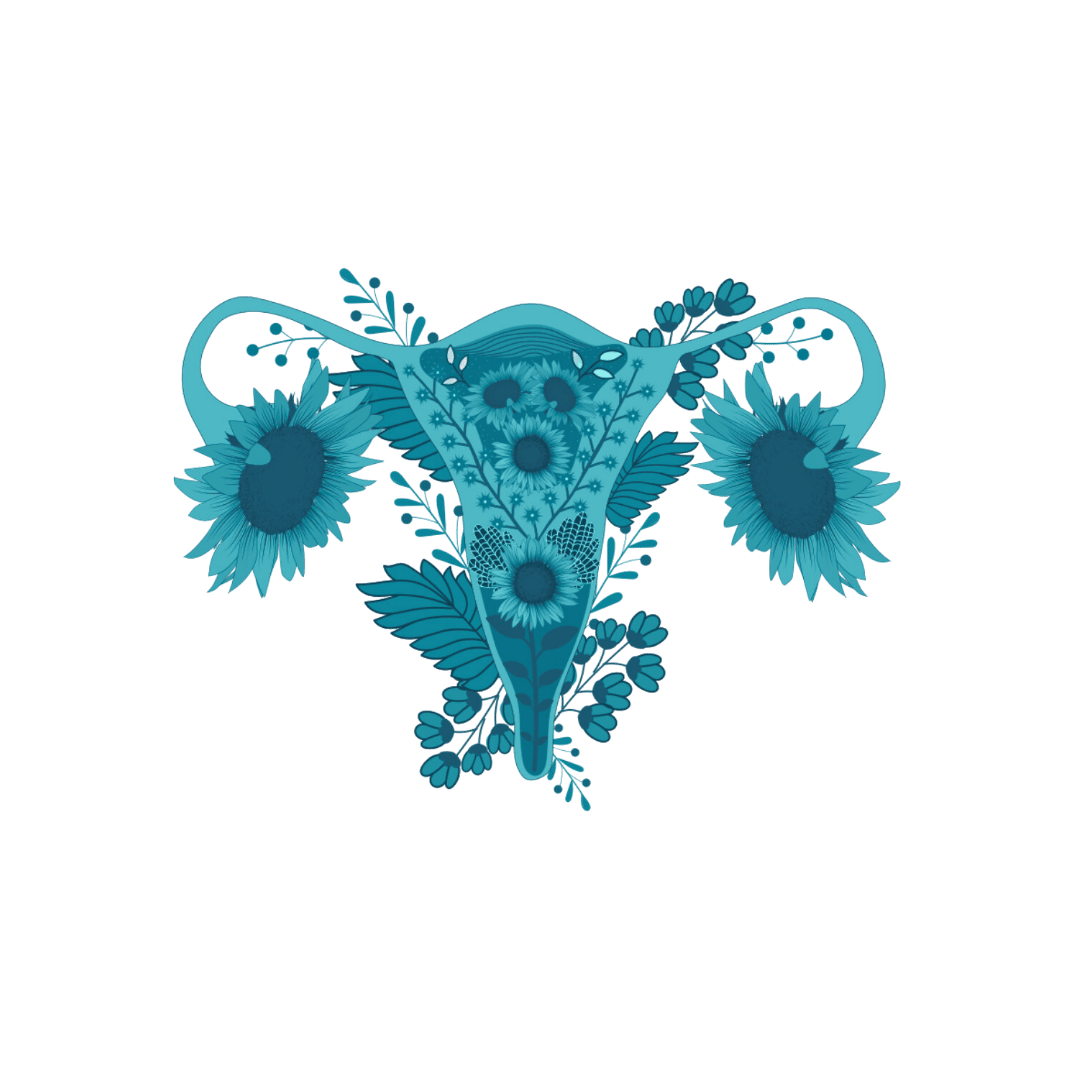Gynaecology
Polycystic Ovary Syndrome (PCOS)
A complex hormonal condition often associated with irregular periods, skin and hair changes and cysts on the ovaries, that affects around 1 in 5 women of reproductive age.

What is PCOS?
Polycystic ovary syndrome (PCOS) is a hormonal condition that affects up to 1 in 5 women of childbearing age. It is the combination of having many ovarian follicles, identified using ultrasound, with symptoms of a hormone imbalance such as irregular periods, acne or weight gain.
What are the causes of PCOS?
The cause of PCOS is unknown but it is thought that several factors could play a role. Genetics in particular are thought to have an influence as women with PCOS are more likely to have a mother or sister with PCOS.
A main underlying problem is a hormonal imbalance:
- Many women with PCOS have too much insulin in their blood because their body does not respond to the normal amount (insulin resistance). The excess insulin has a direct effect on the way the ovary works
- In women with PCOS, the ovaries appear to make more androgens (male hormones) than normal. High levels of these hormones affect the development and release of eggs during ovulation
What are the symptoms of PCOS?
The symptoms of PCOS can vary from woman to woman, but may include:
Infertility
PCOS is often linked to infertility as it impairs the body’s ability to release an egg each month.
Infrequent, absent and/or irregular menstrual periods
If you have very irregular or only sporadic periods, this may be an indication you are not ovulating and you may need medical assistance to have a baby.
Hirsutism (excess body hair)
Increased hair growth on the face, chest, stomach and back can indicate a hormonal imbalance and is often seen in patients with PCOS.
Cysts on the ovaries
As the name suggests, PCOS is associated with the appearance of multiple cysts on the ovaries. These cysts impact on the ability to ovulate normally and can therefore impact fertility.
Acne
Because of the hormonal imbalances caused, those with PCOS often experience acne.
Weight gain or obesity
As with acne, the hormonal imbalances associated with PCOS frequently contribute to weight gain and obesity.
Pelvic pain
Can be caused by ovarian cysts and/or abdominal bloating often associated with PCOS.
Sleep apnea
People with PCOS, especially those who experience weight gain or suffer from obesity, are more likely to endure disordered sleep due to disrupted breathing patterns.
Anxiety or depression
Research has shown that the symptoms of PCOS such as acne, weight gain, hirsutism and infertility can negatively impact self-confidence, mood and body image all of which can contribute to anxiety and/or depression.
How PCOS Affects the Endocrine System
PCOS (Polycystic Ovary Syndrome) isn’t just about fertility—it’s a hormonal imbalance involving your body’s endocrine system, which can have implications on other body systems.
Managing PCOS often requires addressing multiple hormone imbalances at once—through diet, lifestyle changes, or medications—to restore endocrine balance and improve overall wellbeing.
Ovaries and Hormone Imbalance
With PCOS, your ovaries don’t regularly mature and release eggs (ovulation). Instead, multiple small follicles develop but remain immature, leading to elevated production of androgens (“male” hormones such as testosterone). Irregular periods, acne, excessive hair growth, or thinning scalp hair are due to increased androgen levels, caused by the disruption of ovulation.
Insulin Resistance and PCOS
Many women with PCOS experience insulin resistance, where the body’s cells become less responsive to insulin, a hormone that regulates blood sugar. Your pancreas then compensates by producing extra insulin, which further increases androgen production by your ovaries. This cycle can worsen PCOS symptoms, cause weight gain (especially around your abdomen), and increase the risk of developing diabetes.
Broader Endocrine Impacts
PCOS affects more than just the ovaries and pancreas. It also influences hormones from your pituitary gland in the brain, often increasing LH (luteinizing hormone) levels, which further drive androgen production. Additionally, PCOS often leads to lower levels of SHBG (sex hormone-binding globulin), meaning there’s more free testosterone circulating in your body.
This hormonal imbalance explains why PCOS symptoms extend beyond fertility issues, affecting skin, hair, weight, mood, and overall metabolism.
PCOS Symptoms & Management
PCOS (Polycystic Ovary Syndrome) can cause a range of symptoms, and each woman’s experience may be different. Some women have just one or two noticeable issues, while others have multiple.
Common PCOS symptoms include:
- Irregular menstrual cycles
- Signs of high androgen levels (such as extra facial or body hair and acne)
- Weight gain or difficulty losing weight
- Polycystic ovaries visible on an ultrasound
- Sometimes, challenges with fertility
This variability makes PCOS tricky to diagnose because not everyone has all the same symptoms.
Diagnosing PCOS
Doctors often use the Rotterdam criteria as a guide for diagnosis. According to these criteria, a PCOS diagnosis can be made if a woman has at least 2 out of 3 of the following features:
- Irregular periods or lack of ovulation: Menstrual cycles that are infrequent, irregular, or absent (indicating that ovulation isn’t happening regularly).
- Signs of high androgens: This can be clinical signs like acne or excess hair growth (hirsutism), or biochemical signs such as elevated testosterone levels on a blood test.
- Polycystic ovaries on ultrasound: An ultrasound shows the ovaries have many small follicles (often called “cysts”) arranged around the edge of the ovary. (Having polycystic-looking ovaries alone isn’t enough for diagnosis, but it counts as one of the criteria when combined with other symptoms.)
- More recently, a raised AMH test can also be a marker of polycystic ovaries
It’s important that other conditions are ruled out before confirming PCOS, since several disorders (like thyroid problems or elevated prolactin levels) can cause similar symptoms. Your doctor will consider your history, symptoms, and possibly do an ultrasound and blood tests to make the diagnosis.
Managing PCOS Symptoms
Polycystic Ovary Syndrome (PCOS) affects various aspects of health and often requires a combination of approaches to manage symptoms. Effective treatment can vary based on individual goals, such as improving cycle regularity, managing skin or hair symptoms, or enhancing fertility. Key strategies include:
Healthy Weight & Lifestyle
Weight management is a first-line approach for many women with PCOS. Weight gain can worsen PCOS symptoms, so maintaining a healthy weight can help balance your hormones.
If you are overweight, losing even about 5% of your body weight may lead to noticeable improvements in cycle regularity and symptom relief. However, this isn’t universal – not all women with PCOS are overweight.
Overall, a balanced diet and regular exercise improve the body’s insulin sensitivity and can reduce PCOS symptoms. Doctors often encourage lifestyle changes as the foundation of PCOS management.
Improving Insulin Resistance
Many women with PCOS have a condition called insulin resistance, where the body’s cells don’t respond well to insulin (the hormone that regulates blood sugar). This leads the body to produce extra insulin to keep blood sugar stable.
High insulin levels can trigger the ovaries to produce more androgens (male hormones), which in turn can worsen symptoms like irregular periods and hair growth.
Tackling insulin resistance can greatly improve PCOS symptoms. Doctors may prescribe medications like metformin (a medicine originally for type 2 diabetes) to help your body use insulin more effectively.
By improving the way your body processes insulin, these treatments address an underlying driver of PCOS – leading to more balanced hormones, more regular periods, and sometimes improvements in weight management and skin symptoms.
Ovulation Induction for Fertility
If getting pregnant is a goal, a common approach is ovulation induction – using medications to help the ovaries release an egg regularly. Drugs such as clomiphene citrate or letrozole are often used to stimulate ovulation.
About 75–80% of women with PCOS will ovulate with these medications, which greatly increases the chance of pregnancy in those individuals. Many patients with PCOS do conceive with the help of these ovulation medications.
If ovulation medications alone aren’t successful, the next step might be assisted reproductive technologies like IVF (in vitro fertilization). Roughly 20–25% of women with PCOS who do not respond to simpler treatments may need IVF or other advanced fertility treatments to achieve a pregnancy.
Hormonal Birth Control (Cycle Regulation)
For women who are not currently trying to get pregnant, the focus of treatment is cycle suppression in managing hormonal symptoms. The most common tool for this is the oral contraceptive pill. The pill helps to make periods regular and prevents the uterine lining from building up excessively when periods are infrequent.
In addition, birth control pills lower your body’s own testosterone levels (by increasing a hormone-binding protein), which can improve acne and reduce unwanted hair growth. Many patients find that being on the pill leads to more predictable, lighter bleeding and improvement in PCOS-related symptoms like acne.
If the OCP is not suitable for you, other methods to protect the uterus and regulate bleeding include occasional courses of a progesterone pill (to induce a bleed every few months) or a hormonal intrauterine device (IUD). These don’t fix the underlying hormone imbalance, but they ensure you have regular uterine bleeding and can help with symptoms.
Other Medications and Health Considerations
Depending on your symptoms, doctors might address other aspects of PCOS. For example, if excess hair growth is a major issue, there are specific medications or topical treatments to reduce hair. If acne is severe, dermatological treatments or certain hormonal therapies can help.
It’s also important to monitor and manage related health risks: women with PCOS, especially if overweight, have a higher risk of developing things like type 2 diabetes and high cholesterol in the long term. Your healthcare provider may check your blood sugar and cholesterol levels and recommend preventive measures (like diet changes or medications) as needed.
PCOS can also sometimes affect mood – some women experience anxiety or depression related to their symptoms or hormone fluctuations, so emotional well-being is an important part of management too.

